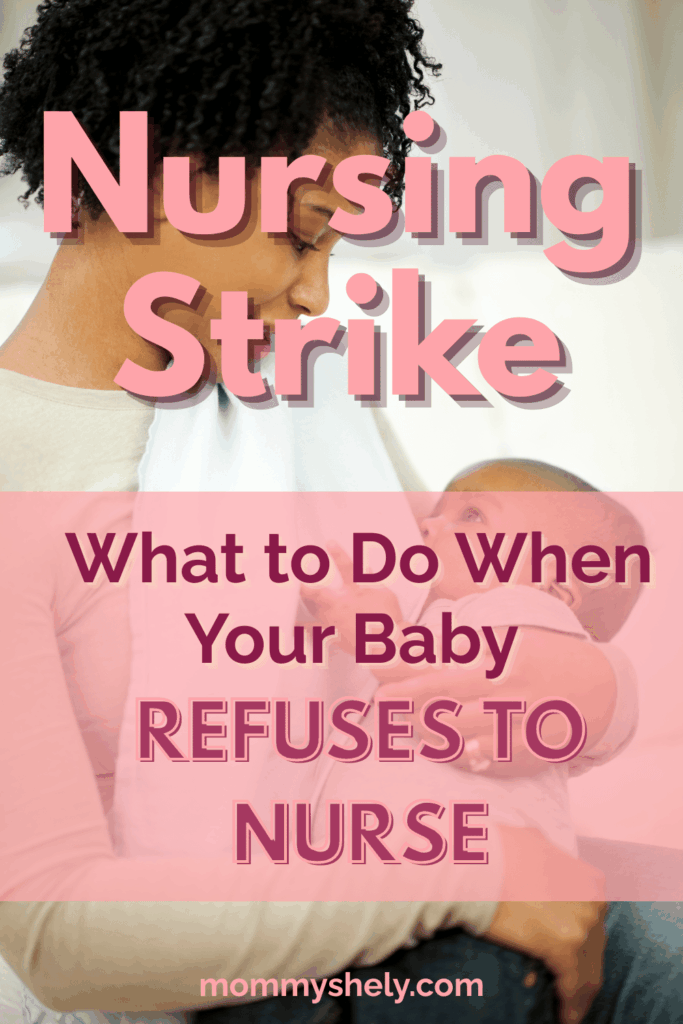Have you ever tried breastfeeding your baby only to face a mini protestor who refuses to nurse, no matter what you do?
One moment they’re latching happily, and the next, your little one turns away, fusses, or even screams.
If this sounds familiar, you’re not alone, you might be experiencing what’s called a nursing strike.
Trust me, I’ve been there, done that, and have the milk-stained T-shirt to prove it!
But don’t worry, because with a bit of understanding and some proven tips, you can successfully nurse even the most tenacious baby!
Pin For Later!

What Is a Nursing Strike?
A nursing strike, also called a breastfeeding strike, is when a baby who has been feeding well suddenly refuses to breastfeed.
This often seems to happen out of the blue and can be distressing for both mom and baby.
Nursing strikes usually last between 2 to 4 days, however they can last longer.
It’s important to distinguish a nursing strike from weaning:
- A nursing strike is a temporary refusal to nurse.
- Weaning is a gradual, permanent process where the baby reduces breastfeeding in favor of other foods.
Why Do Babies Refuse to Nurse?
Let’s explore the most common reasons a baby or an infant refuses to nurse, and what may trigger a breastfeeding strike:
Changes in Taste or Smell
Babies are sensitive to changes in your scent or milk flavor. If you’ve recently used a new soap, deodorant, or lotion, your baby might notice the difference in your smell and become hesitant to nurse.
Similarly, eating strong-flavored foods or hormonal changes (like getting your period or becoming pregnant) can change the taste of your milk, which your baby might not like.
Health Issues
If your baby has a cold, a stuffy nose can make it hard for them to breathe while nursing.
Ear infections or teething can also make sucking painful, leading to nursing strikes.
Thrush, a common fungal infection, can make your baby’s mouth sore, making nursing uncomfortable. Look for white patches in their mouth and see your doctor for treatment.
Additionally, an injury or soreness from a vaccination might cause discomfort in certain breastfeeding positions.
If you’ve been sick or taking medication, this can also contribute to nursing difficulties.
Slow Milk Flow
If your milk letdown is slow, your baby might get impatient and frustrated, turning away from the breast.
Especially if you’re combining both breastfeeding and bottle feeding, whether it’s pumped breast milk or formula.
Your baby may become accustomed to a faster flow from the bottle and grow restless during breastfeeding when the milk doesn’t come as quickly.
Distractions and Fussiness
Babies are easily distracted by their surroundings, especially as they grow and become more aware of the world around them.
Overstimulation from noise, lights, or activity can make it hard for them to focus on nursing.
Additionally, delayed feedings or extended separations from you can cause fussiness and make nursing more challenging.
If your baby bites during breastfeeding and you react strongly, it might startle them and make them hesitant to nurse again.
Emotional Shifts or Separation
Starting a new job, leaving your baby with someone else more often, or simply being busier than usual can disrupt your usual nursing routine.
Babies thrive on consistency, so any significant changes can trigger a nursing strike.

What to Do When Baby Refuses to Nurse
Let’s talk strategies. Here are 10 ways to gently guide your baby back to the breast during a nursing strike:
Investigate the Cause
Try to sleuth out what’s causing the strike, whether it’s a stuffy nose or discomfort from teething.
Understanding the underlying issue can guide your approach, helping you develop a plan to encourage your baby to breastfeed and providing reassurance that there’s a solution at hand.
Stay Calm
Easier said than done, I know. But trust me, babies can smell fear (or is that just sour milk?), so keep your cool.
Staying calm is key. Don’t force it. The more relaxed you are, the more likely they’ll be to give nursing another try.
Breathe. Take breaks. Reconnect.
Mix Things Up
If the usual nursing spot feels like a battleground, try changing the scenery.
A cozy corner, a rocking chair, or even a picnic blanket in the backyard might do the trick.
Additionally, try feeding your baby in a quiet room with no distractions to create a calm environment.
Change positions
Try different breastfeeding positions to see if you can get your baby more comfortable.
Read more about the common breastfeeding positions here.
Alternatively, you can attempt breastfeeding your baby while using a carrier; perhaps the movement will aid in soothing them.
Nurse during Sleepy Times
Try offering your breast to your baby during sleepy times, like during dream feeds or when they’re drifting off to sleep.
Sleeping together can provide easy access to the breast, making it more enticing for a baby who may be uninterested in feeding when awake.
Offer skin-to-Skin Snuggles
When all else fails, revert to the ultimate bonding technique: skin-to-skin.
Try cuddling your baby and engaging in skin-to-skin contact, which can renew their interest in breastfeeding.
Use Breast Compression
If your letdown is slow, try breast compressions while nursing to keep the milk flowing and encourage your baby to stay engaged.
Massage your breast gently to stimulate flow, this can reduce frustration and keep baby latched longer.
Pump and Offer Expressed Milk
If your baby refuses entirely, use a pump to keep your supply up. Offer the milk by cup, spoon, or bottle if needed.
Pumping also stimulates continued production so you’re ready when your baby resumes nursing.
Avoid Negative Associations
Avoid scolding, pressuring, or forcing a latch. If biting was the cause, respond gently and shift focus, don’t punish or push away. Rebuild trust with warmth and affection.
Be Consistent and Patient
Continue offering the breast without forcing it. Every baby ends a nursing strike on their own timeline.
Trust the process – it usually resolves within a few days.
When to Get Help
Sometimes, a baby nursing strike doesn’t improve right away, and that’s okay.
When is it time to throw in the towel and call in reinforcements?
- Your baby is showing signs of dehydration (dry diapers).
- Your baby is losing or not gaining weight.
- You’re feeling overwhelmed, stressed, or downright exhausted.
- The strike lasts for more than 4-5 days, despite your best efforts.
Remember, there’s no shame in asking for help. Whether it’s reaching out to a lactation consultant, seeking advice from fellow parents, or scheduling a check-up with your pediatrician, support is out there!
Nursing strikes are frustrating, emotional, and sometimes even heartbreaking. But you are not alone, many moms face this, and most babies come back to the breast.
Whether your baby or infant is refusing to nurse for a day or longer, keep showing up. With calm, compassion, and a little creativity, you’ll find your way through.
So, to all the tired, frustrated, milk-stained mamas out there, I salute you! You’ve got this!
With love,
Shely



